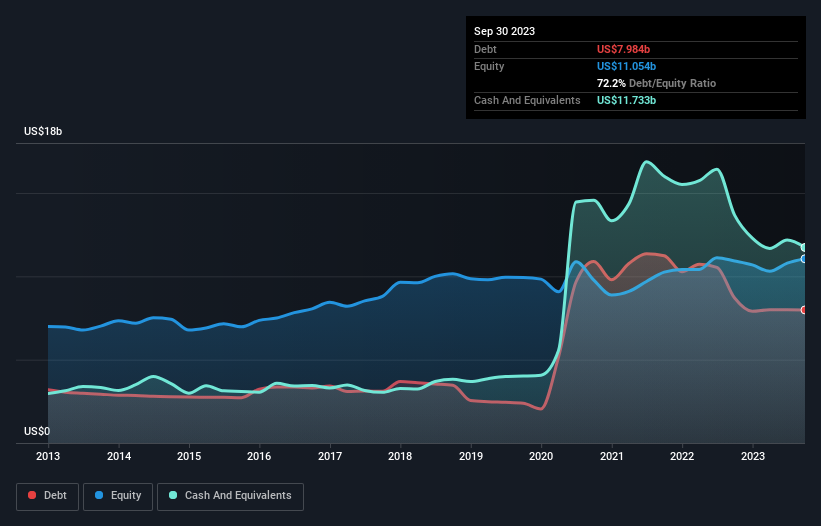- United States
- /
- Airlines
- /
- NYSE:LUV
Here's Why Southwest Airlines (NYSE:LUV) Has A Meaningful Debt Burden

David Iben put it well when he said, 'Volatility is not a risk we care about. What we care about is avoiding the permanent loss of capital.' So it might be obvious that you need to consider debt, when you think about how risky any given stock is, because too much debt can sink a company. As with many other companies Southwest Airlines Co. (NYSE:LUV) makes use of debt. But should shareholders be worried about its use of debt?
Why Does Debt Bring Risk?
Debt assists a business until the business has trouble paying it off, either with new capital or with free cash flow. Part and parcel of capitalism is the process of 'creative destruction' where failed businesses are mercilessly liquidated by their bankers. However, a more frequent (but still costly) occurrence is where a company must issue shares at bargain-basement prices, permanently diluting shareholders, just to shore up its balance sheet. Of course, plenty of companies use debt to fund growth, without any negative consequences. The first thing to do when considering how much debt a business uses is to look at its cash and debt together.
See our latest analysis for Southwest Airlines
What Is Southwest Airlines's Debt?
The image below, which you can click on for greater detail, shows that Southwest Airlines had debt of US$7.98b at the end of September 2023, a reduction from US$8.70b over a year. But on the other hand it also has US$11.7b in cash, leading to a US$3.75b net cash position.

How Strong Is Southwest Airlines' Balance Sheet?
Zooming in on the latest balance sheet data, we can see that Southwest Airlines had liabilities of US$12.1b due within 12 months and liabilities of US$13.8b due beyond that. Offsetting this, it had US$11.7b in cash and US$1.42b in receivables that were due within 12 months. So its liabilities outweigh the sum of its cash and (near-term) receivables by US$12.8b.
This is a mountain of leverage even relative to its gargantuan market capitalization of US$17.3b. Should its lenders demand that it shore up the balance sheet, shareholders would likely face severe dilution. Despite its noteworthy liabilities, Southwest Airlines boasts net cash, so it's fair to say it does not have a heavy debt load!
It is just as well that Southwest Airlines's load is not too heavy, because its EBIT was down 85% over the last year. When it comes to paying off debt, falling earnings are no more useful than sugary sodas are for your health. The balance sheet is clearly the area to focus on when you are analysing debt. But ultimately the future profitability of the business will decide if Southwest Airlines can strengthen its balance sheet over time. So if you're focused on the future you can check out this free report showing analyst profit forecasts.
Finally, while the tax-man may adore accounting profits, lenders only accept cold hard cash. Southwest Airlines may have net cash on the balance sheet, but it is still interesting to look at how well the business converts its earnings before interest and tax (EBIT) to free cash flow, because that will influence both its need for, and its capacity to manage debt. Over the last two years, Southwest Airlines recorded negative free cash flow, in total. Debt is far more risky for companies with unreliable free cash flow, so shareholders should be hoping that the past expenditure will produce free cash flow in the future.
Summing Up
While Southwest Airlines does have more liabilities than liquid assets, it also has net cash of US$3.75b. Despite its cash we think that Southwest Airlines seems to struggle to grow its EBIT, so we are wary of the stock. There's no doubt that we learn most about debt from the balance sheet. However, not all investment risk resides within the balance sheet - far from it. Be aware that Southwest Airlines is showing 3 warning signs in our investment analysis , and 1 of those is concerning...
Of course, if you're the type of investor who prefers buying stocks without the burden of debt, then don't hesitate to discover our exclusive list of net cash growth stocks, today.
New: Manage All Your Stock Portfolios in One Place
We've created the ultimate portfolio companion for stock investors, and it's free.
• Connect an unlimited number of Portfolios and see your total in one currency
• Be alerted to new Warning Signs or Risks via email or mobile
• Track the Fair Value of your stocks
Have feedback on this article? Concerned about the content? Get in touch with us directly. Alternatively, email editorial-team (at) simplywallst.com.
This article by Simply Wall St is general in nature. We provide commentary based on historical data and analyst forecasts only using an unbiased methodology and our articles are not intended to be financial advice. It does not constitute a recommendation to buy or sell any stock, and does not take account of your objectives, or your financial situation. We aim to bring you long-term focused analysis driven by fundamental data. Note that our analysis may not factor in the latest price-sensitive company announcements or qualitative material. Simply Wall St has no position in any stocks mentioned.
About NYSE:LUV
Southwest Airlines
Operates as a passenger airline company that provides scheduled air transportation services in the United States and near-international markets.
Fair value with moderate growth potential.

